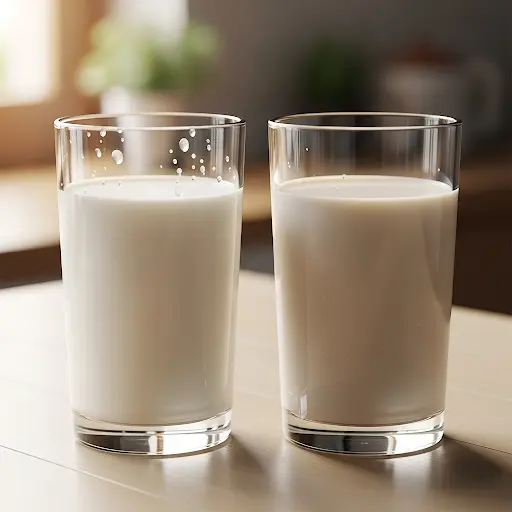Dairy vs. The Plant-Based Revolution: What’s Really in Your Glass?

Dairy vs. The Plant-Based Revolution: What’s Really in Your Glass?
The once-simple act of choosing milk has become a complex decision. The dairy aisle has been joined by a growing number of plant-based alternatives, from almond and oat to soy and coconut. While cow's milk has been a staple for centuries, these new options have sparked a global conversation about what's really the healthiest, most sustainable choice. Understanding the nutritional pros and cons of each is key to making an informed decision.
The Nutritional Power of Dairy
For generations, cow's milk has been considered a cornerstone of a healthy diet, and for good reason. It is a complete protein, meaning it contains all nine essential amino acids necessary for the body's growth and repair. It is also an excellent natural source of calcium, which is vital for strong bones and teeth, and is often fortified with Vitamin D, a nutrient crucial for calcium absorption. For those without lactose intolerance or dairy allergies, milk provides a rich, balanced blend of fats, proteins, and carbohydrates, making it a highly nutritious food.
The Rise of Plant-Based Milks
The surge in popularity of plant-based milks is driven by various factors, including the rise of veganism, environmental concerns, and a growing number of people with lactose intolerance. These alternatives offer unique benefits:
- Oat Milk: Known for its creamy texture, oat milk is often a good source of fiber and can be fortified with B vitamins.
- Almond Milk: It is naturally low in calories and fat, making it a popular choice for those watching their weight. However, it is significantly lower in protein than dairy milk.
- Soy Milk: Nutritionally, soy milk is the closest alternative to dairy, as it provides a comparable amount of protein and is also a complete protein source.
It is important to note that many plant-based milks are fortified with added vitamins and minerals to mimic dairy milk's profile, but they can also contain added sugars to improve taste.
Making the Right Choice for You
Ultimately, the best choice depends on your personal health needs and lifestyle. For those with allergies or intolerance, plant-based options are a lifesaver. For others, the decision may come down to taste or ethical beliefs. When choosing an alternative, always check the nutrition label for protein content, added sugars, and fortification with key nutrients like calcium and Vitamin B12. Whether you choose traditional dairy or a plant-based alternative, both can be part of a healthy, balanced diet.


